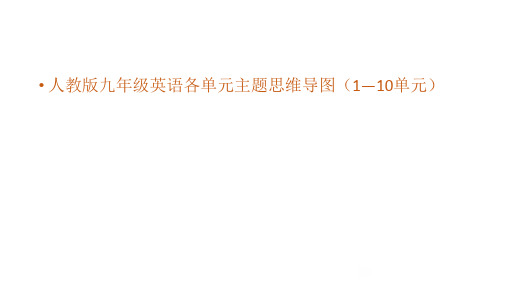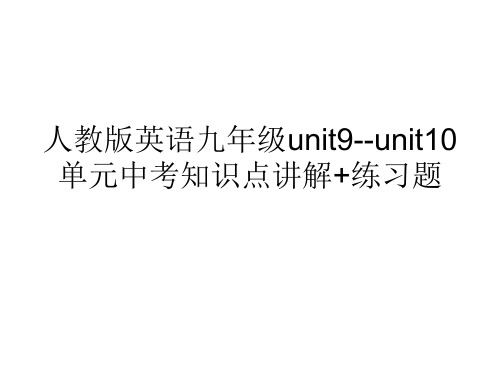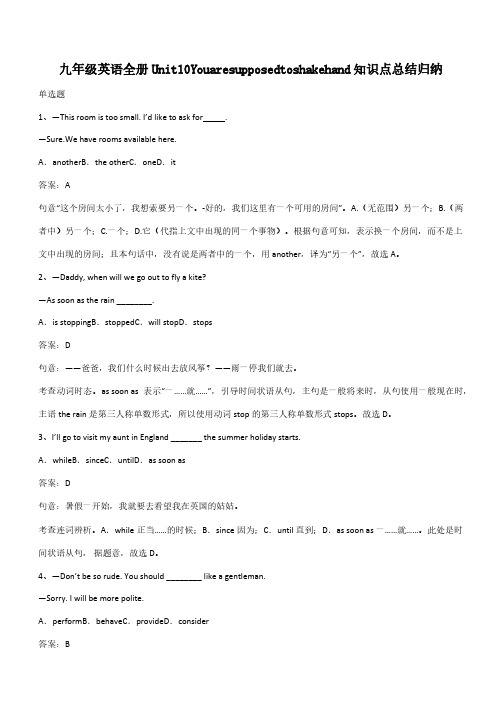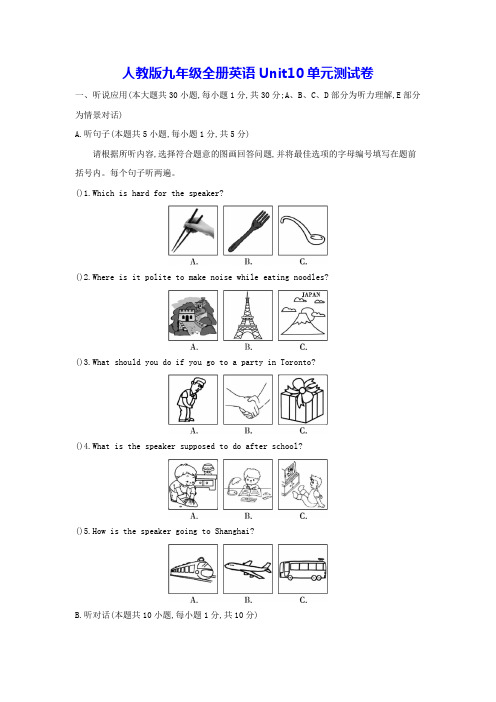人教版英语九年级全册单元unit10知识点+测试卷+思维导图
人教版初中英语九年级全册语法知识点思维导图

`how引导的特殊疑问句by+doing sthThe+比较级,the+比较级It's+形容词+for sb to do sth Sb find it+形容词+to do sth 固定搭配的用法finish doing sth/t 「y to do sthwhat引导的感叹旬What+ (a/an)+ad」+名词(+主话+谓语+其他)lHow+ad」/adv+主语+谔语+其他l情态动词wou ld 、could 的用法Could you please tell me how to get to the post office ?Section A How I Learned to Learn EnglishSection B How Can You Become a Successful Learner?Section A Full Moon,Full FeelingsSection B The Spirit of ChristmasSection A Fun T imePark-Always a Fun TimeUnit1 How can we become good learners7Unit2 I think thatmooncakes are delicious!Unit3 Could you please tell me where the restrooms are?Could you please tell me where the 「estau「ants a「e?used to do 的用法I used to be af 「aid of the dark. 形容词最离级的用;the+序数词+最窝级+N 第几One of the/形容词性物主代词+N s 谓语用三单N o matter+whaVwhen/where 二whatever/whenever/whereverSection B Could You please (7)Section A From Shy Girl to Pop Sta「Section B He Studies Harder Than He Used T oSection A The Dificult Search for American Products in the USb e made from和be made of 的用法和区别般现在时的被动语态am/is/are+过去分词Section B Beauty 1n Common Thingssometi m e 一段时间sometimes有时some times几次sometime某个时候等饲语辨析be used by sb. 被某人使用—股过去时的被动语态was/we飞+过去分词常用的系动词有look,feel,be,become,get,turn,smell,taste,stay(保待),keep 等词的用法Section A AnAccidental InventionSection B Do You Know When BasketballWas Invented?r section A Mom Konws BestUnit4 I used to be afraid of the darkUnit5 What are the shirts made of?Unit6 When was it invented?Unit? Teenagers should be allowed to choose their own clothesalso 、创her 、too 的用法She is a sixteen-year-old girl 二She is sixteen yea 「s oldSection B Should I Be Allowed to Make My Own Decisions? IUnit8 It must belong to Carla.Section A Read the article and decide which might be the best titlesomething,anything,nothing, everything等不定代词There must be something visiting our home must, m ay, m ight, c ou l d,may,can't S ecti o n B Stonehenge---Can Anyone Exp固n Why It Is There?The d心onary must be mineSection A What Do You Feel Like Watching Today?Unit9 I like music that I can dance toSection A Read the following opinionsUnit10 You're supposed to shake hands.Unit11 Sad moviesmake me erUnit12 Life is full of the unexpected.Unit13 We'「e tr ying to save the earth!Section A The Shirt of a Happy Man,ection B The Winnin a函m Section A Life Is Full of the UnexpectedSection B Read the passageSection A Save the Sharks!Section A I RememberUnit14 I remember meeting all of vou in Grade7Section B Readthe passageI like music that I can dance toWe are supposed to stoo smokin g .it 是形式主语或形式宾语I was supposed toarrive at7:00make sb do/make sb adjSoft and quiet music makes me relax.I 过去完成时的逻用By the time I got outside,the bus had already leftI was about to go up to my of f ice when I decided to get a cof f ee firstHe used not to stay up late.清态动词的被动语态情态动词+be +动词的过去分词a d ifferent些基本句型的I凡固和使用I remember being avolunteer.。
人教版九年级英语各单元主题思维导图(1-10)

Learning how to learn
单元整体话题篇
Structures
A: Do you learn English by reading aloud? B: Yes, I do. It helps with my pronunciation A: How can I improve my pronunciation? B: Well, one way is by listening to tapes.
阅读篇-Section B 2b
The Spirit of Christmas
Sharing and giving love and joy
The Best Example: A Christmas Carol (a novel by Charles Dickens)
three ghosts 1. the Ghost of... Past 2. the Ghost of... Present 3. the Ghost of... Yet to Come
Keep practicing what they have learnt
Be not afraid of making mistakes By writing down key words or by drawing mind maps
By reading notes every day or by explaining the information to another student
by working with friends /a group by writing e-mails to pen pals take notes by writing down key words or by drawing mind maps Maybe you should join an English club. Don't read word for word. Read word groups. Be patient. It takes time. Practice makes perfect.
英语人教版九年级全册初中常见时态总结 思维导图式

初中英语时态复习巩固“三个一般,两个进行,两个完成”一般现在时现在进行时现在完成时一般过去时一般将来时过去进行时过去完成时一、一般现在时(概念,句式结构,常用时间状语;用法)1、概念,句式结构,常用时间状语。
(1)概念:一般现在是主要表示经常性或习惯性的动作或存在的状态,也可表示现在的情况或状态以及永恒的真理。
(2)句式结构:Be(is , am , are) +表语,如:She is a beautiful girl.There be (is , are )句型,如:There is a schoolbag on the desk.实义动词作谓语, 谓语用动词原形,但主语是第三人称单数时,谓语要用相应的单数第三人称形式如:They usually go to school on foot.She likes chocolate.(3)常用时间状语:always,usually,often,everyday等。
2.一般现在时的用法(1)表示经常性或习惯性的动作或存在的状态,常与表频度的时间状语连用。
如:My mother often does housework. 我妈妈经常做家务。
(2)描述现在的情况,状态等。
如:He speaks Russian very well.他讲俄语讲得很好。
(3)描述客观真理、客观存在或科学事实等。
如:Light travels faster than sound.光比声音传播速度快。
(4)注:在含时间状语从句或条件状语从句的复合句中,若主句用一般将来时,则从句用一般现在时表示将来,即“主将从现”如:I will ring you if he comes back tomorrow.如果他明天回来,我就给你打电话。
例: I will send you an e-mail as soon as I _________in Canada.A. arrive B arrived C am arriving D will arrive(5) 在以here , there开头的句子中常用一般现在时代替进行时。
人教版英语九年级Unit9--Unit10单元中考知识点讲解+练习试题(共20张PPT)

2 suppose的用法
5. We are not supposed ____A____ mobile
phones in class. It will make us miss some
key points.
A. to play
B. played
C. playing
D. to playing
worth the ____D____ and effort we devoted to
it.
A. value
B. trouble
C. honor
D. time
如:This secondhand car is worth $2, 000 at most. 这辆二手汽车最多值2000美 元。
注意:一般来说,worth前可用well, really, much, hardly, easily等词修饰。
1. perform (v.)
熟
A. 表演;执行
词
B. 工作;运转
新
(1)(2018北京阅读C)The study was performed
义
among 253 school children in Spain.____A____
(2)The company is performing well.______B__
表示一种排除关系,except后跟内容不 except
包括在内。 表示一种累加关系,besides后跟内容包 besides 括在内。 常与nobody/nothing/no one等表示否定 but 的不定代词连用,与except同义。 说明整体基本情况后,对细节加以纠正, except for 表示“美中不足的是”。 注:besides 还可用作副词,意为“而且,还有”。
九年级英语全册Unit10Youaresupposedtoshakehand知识点总结归纳(带答案)

九年级英语全册Unit10Youaresupposedtoshakehand知识点总结归纳单选题1、—This room is too small. I’d like to ask for .—Sure.We have rooms available here.A.anotherB.the otherC.oneD.it答案:A句意“这个房间太小了,我想索要另一个。
-好的,我们这里有一个可用的房间”。
A.(无范围)另一个;B.(两者中)另一个;C.一个;D.它(代指上文中出现的同一个事物)。
根据句意可知,表示换一个房间,而不是上文中出现的房间;且本句话中,没有说是两者中的一个,用another,译为“另一个”,故选A。
2、—Daddy, when will we go out to fly a kite?—As soon as the rain ________.A.is stoppingB.stoppedC.will stopD.stops答案:D句意:——爸爸,我们什么时候出去放风筝?——雨一停我们就去。
考查动词时态。
as soon as表示“一……就……”,引导时间状语从句,主句是一般将来时,从句使用一般现在时,主语the rain是第三人称单数形式,所以使用动词stop的第三人称单数形式stops。
故选D。
3、I’ll go to visit my aunt in England _______ the summer holiday starts.A.whileB.sinceC.untilD.as soon as答案:D句意:暑假一开始,我就要去看望我在英国的姑姑。
考查连词辨析。
A.while正当……的时候;B.since因为;C.until 直到;D.as soon as一……就……。
此处是时间状语从句,据题意,故选D。
4、—Don’t be so rude. You should ________ like a gentleman.—Sorry. I will be more polite.A.performB.behaveC.provideD.consider答案:B句意:——别这么粗鲁。
人教版九年级全册英语Unit10单元测试卷(Word版,含答案)

人教版九年级全册英语Unit10单元测试卷一、听说应用(本大题共30小题,每小题1分,共30分;A、B、C、D部分为听力理解,E部分为情景对话)A.听句子(本题共5小题,每小题1分,共5分)请根据所听内容,选择符合题意的图画回答问题,并将最佳选项的字母编号填写在题前括号内。
每个句子听两遍。
()1.Which is hard for the speaker?()2.Where is it polite to make noise while eating noodles?()3.What should you do if you go to a party in Toronto?()4.What is the speaker supposed to do after school?()5.How is the speaker going to Shanghai?B.听对话(本题共10小题,每小题1分,共10分)请根据每段对话的内容回答问题,从每小题所给的三个选项中选出一个最佳答案,并将最佳选项的字母编号填写在题前括号内。
每段对话听两遍。
听第一段对话,回答第6小题。
()6.What are the Japanese supposed to do when they meet for the first time?A.To bow.B.To kiss.C.To shake hands.听第二段对话,回答第7小题。
()7.When do people in Colombia usually arrive if they are invited to a party at 6:30?A.Just 6:30.B.Before 6:30.C.A little later than 6:30.听第三段对话,回答第8小题。
()8.What’s Ann doing while eating?A.Making noise.B.Keeping quiet.C.Eating too slowly.听第四段对话,回答第9小题。
Unit10知识点总结人教版九年级英语全册

人教版九年级英语上册unit 10知识点总结一,短语总结Section Abe supposed to do sth. 应该做某事shake hands 握手meet for the first time 第一次见面be expected to do sth. 被期望/ 要求做某事an exchange student 一名交换生greet sb. the wrong way 以错误的方式和某人打招呼make some mistakes 犯一些错误wele party 欢迎派对as soon as 一……就……hold out my hand 伸出我的手to one’s surprise 令某人惊讶的是kiss sb. on both sides of sb.’s face 亲吻某人的脸颊be relaxed about time 时间观念不强a little / bit late 有点儿晚enjoy our time slowly 慢慢享受我们的时光value time 珍惜时间in our everyday lives 在我们的日常生活中drop by 顺便访问;随便进入make plans to do sth. / plan to do sth. 计划做某事be on time 守时 after all 毕竟;终归get mad 大动肝火;气愤make an effort to do sth. 努力做某事avoid heavy traffic 避开拥堵的交通keep sb. doing sth. 让某人一直做某事It’s no big deal. 这没什么大不了的。
wear a suit and tie 穿西装、打领带go abroad 出国clean ... off 把……擦掉during the winter season 在冬季期间take off 脱下(衣服);(飞机等)起飞pack warm clothes 打包暖和的衣服eastern European countries 东欧国家table manners 餐桌礼仪Section Bstick your chopsticks into the food 把筷子插进食物里use your chopsticks to hit an empty bowl 用你的筷子敲空碗point at anyone with your chopsticks 用筷子指着任何人thanks for ... 因……而感谢host family 寄宿家庭go out of one’s way 特地;格外努力make ... feel at home 使……感到宾至如归about one’s age 和某人年龄相仿be fortable doing sth. 轻松做某事the biggest challenge 最大的挑战learn how to behave at the dinner table 学习如何在餐桌上表现得体be different from ... 和……不同cut up 切碎 get used to 习惯于have a good school year 度过一个愉快的学年behave properly 举止得体have a safe trip 旅途安全show up 露面;出现knock on / at the door 敲门二,语法总结✅ You're supposed to shake hands.➡️be supposed to do sth.“应该做某事”,用来表示劝告,义务,责任,建议等。
九年级人教英语unit10知识点

九年级人教英语unit10知识点Unit 10 Knowledge Points in 9th Grade People’s Education EnglishAs we approach the end of the school year, it's important to revise and consolidate the knowledge we have gained throughout the academic term. In this article, we will delve into the key concepts and skills covered in Unit 10 of the 9th Grade People's Education English curriculum. Let's explore these points in detail.1. Expressions and Phrases:Unit 10 introduces a variety of useful expressions and phrases related to studying and learning. Students learn how to describe their preferences, opinions, and experiences. Some examples include "I prefer studying alone," "In my opinion," and "I have had the pleasure of attending many interesting lectures." These phrases not only enhance their vocabulary but also help them to express themselves more effectively in different situations.2. Passive Voice:Unit 10 focuses on the usage and understanding of the passive voice. Students learn how to form passive voice sentences, understand the difference between active and passive voice, and gain insight into whenit is appropriate to use each. Passive voice sentences are often used in academic writing or when the subject is not essential to the meaning of the sentence. For example, "The book was written by a famous author" or "The decision was made by the committee." This knowledge enables students to construct more nuanced and sophisticated sentences.3. Reading Comprehension:Unit 10 provides students with a variety of reading materials to enhance their reading comprehension skills. Through different texts, students learn to identify main ideas, make inferences, and draw conclusions. They also practice decoding new vocabulary within context, improving their overall language proficiency. Reading comprehension is an essential skill that students will continue to develop throughout their academic journey and in their everyday lives.4. Writing Skills:Unit 10 includes lessons on different writing genres, such as emails, opinions, and letters. Students learn how to structure their writing effectively, including proper greetings and closing phrases, appropriate paragraphing, and clear and concise expressions of ideas. They also focus on using appropriate register and tone for different audiences and purposes. These writing skills will equip students with the ability to communicate effectively both academically and professionally.5. Grammar Review:Unit 10 offers a comprehensive review of various grammar concepts previously taught. Students revisit topics such as the past simple tense, modals, comparative and superlative forms, adverbial clauses of time, and relative clauses. This review helps students reinforce their understanding, correct any misunderstandings, and apply these grammar concepts accurately in their spoken and written language.In conclusion, Unit 10 of the 9th Grade People's Education English curriculum covers a wide range of knowledge points that are essential for students' language development. From improving their vocabulary and expressions to enhancing their reading comprehension and writing skills, this unit provides a solid foundation for their English language proficiency. By mastering these concepts and skills, students will be better equipped to face future challenges in their academic and professional lives.。
- 1、下载文档前请自行甄别文档内容的完整性,平台不提供额外的编辑、内容补充、找答案等附加服务。
- 2、"仅部分预览"的文档,不可在线预览部分如存在完整性等问题,可反馈申请退款(可完整预览的文档不适用该条件!)。
- 3、如文档侵犯您的权益,请联系客服反馈,我们会尽快为您处理(人工客服工作时间:9:00-18:30)。
人教版英语九年级全册单元unit10知识点+测试卷+思维导图Unit 10 You’re supposed to shake hands.1.重点词汇:capital, noon, passport, chalk, blackboard, coast, season, manner, suggestion, kiss, greet, value, knock, exchange, behave, worth, empty...2. 短语归纳:1. be supposed to 应该2. shake hands 握手3. the welcome party 欢迎会4. make friends 交朋友5. as soon as 一……就……6. to one’s surprise 使某人惊讶的是7. everyday lives 日常生活8. drop by 顺便访问;随便进入9. after all 毕竟;终究10. make an effort 付出努力11. at the table 在桌旁12. make...feel at home 使(某人)感到宾至如归13. be/get used to (doing) sth 习惯于做某事14. look forward to doing sth 期盼着做某事15. show up 出现3. 必背典句:1. -What are you supposed to do when you meet someone for the first time? 当你第一次见某人时,你应该做什么?-You’re supposed to shake hands. 你应该握手。
2. -Am I supposed to wear jeans? 我应该穿牛仔裤吗?-No, you’re expected to wear a suit and tie. 不,你应该穿西装打领带。
3. -Is it important to be on time? 准时很重要吗?-Yes, it’s important to be on time. 是的,准时很重要。
4.语法知识:(1)be supposed to+infinitive 应该,应当(2)be expected to+infinitive 被期望或要求;应该(3)It is+adj.+infinitive 做某事是……的。
人教版英语九全Unit10 You're supposed to shake hands.单元测试卷(时间:90分钟分值:100分)一.单项选择(每小题1分,10分)1. We go to school every day Saturdays and Sundays.A. besideB. besidesC. exceptD. except for2. You are not supposed to in class.A. make facesB. make noiseC. listen carefullyD. both A and B3. This math problem is too difficult. Can you show me, George?A. what to work outB. to work it outC. how to work it outD. how to work out it4. Listening to soft music can make you.A. relaxingB. to feel relaxedC. feel relaxedD. felt relaxed5. Your uncle was supposed here an hour ago.A. to beB. to comingC. to goD. to going6. —What do you think of the man?—I find difficult to work with him.A. himB. meC. itD. that7. I’m to see you again.A. pleaseB. pleasureC. pleasedD. pleasing8.they are very tired, they feel very happy because they’ve finally finished their project.A. SoB. AlthoughC. IfD. But9. It is all right if you come late.A. a bit ofB. a little ofC. a bitD. too much10. People in China when they meet for the first time.A. bowB. kissC. shake handsD. laugh二. 完形填空(每小题2分,共20分)Around the world, people have different ideas about what good manners are. When you go to restaurants in different parts of the world, it’s1to know the right and wrong things to do. For example, in China it’s OK to2 a lot of noise in a restaurant. In fact, if a restaurant isn’t noisy and3, you may think there’s something wrong with it. However, in many western countries, restaurants are4places. If people at a table talk too loud, other people who are eating there might even5to the owner of the restaurant.Paying the bill is also different from country to country. In China, one person usually pays for6. In western countries, one person pays if he or she is entertaining clients(宴请宾客), but 7friends eat together, they usually share the cost. This is called “going Dutch(均摊费用)”. Also, when westerners pay the bill, they usually leave some money for the8. This is called “leaving a tip”. Leaving a tip is thought to be polite. In the US, it’s9to leave tips of 10%, 15%, or 20% of the bill, which is decided by how good the service(服务)is. Good waiters can make a lot of money!The way people eat food is not the same in different parts of the world, but you can10the same kinds of food in many countries. Chinese and Indian foods, for example, are popular all over the world.1.A. popular B. difficultC. importantD. enjoyable2. A. cause B. keepC. hearD. make3. A. lively B. friendlyC. luckyD. polite4. A. noisy B. quietC. busyD. clean5. A. shout B. explainC. complainD. speak6. A. everybody B. nobodyC. somebodyD. none7. A. until B. whenC. unlessD. since8. A. gatekeeper B. sellerC. waiterD. visitor9. A. terrible B. commonC. seriousD. unusual10. A. invent B. discoverC. preferD. find三. 阅读理解(每小题2分,共30分)A篇When two people meet, there are a lot of ways of greeting.The ways of greeting are not always the same in different countries.In America, two people usually greet each other with a handshake. It is a way to show respect(尊重)to the other person. Athletes from opposite teams shake hands before a game for the same reason. However, most Americans don’t shake hands when they meet people they have already known well. When American friends meet each other, they might only wave(挥手), or maybe just nod(点头)their heads.In New Zealand, there is a special way of greeting called “Hongi”. In the greeting, two people press their noses and foreheads(前额)together and close their eyes. This is an old traditionthat comes from the Maori, who were the first people to live in New Zealand. Even today, many New Zealanders still press their foreheads when they meet.Kissing is sometimes used as a way to greet someone. In some countries, important people used to wear special rings. It was the custom for visitors to kiss these rings when they came for a meeting. In France, when people meet, they sometimes kiss each other on the face.In Japan, people bow to each other every time they meet. Even family members bow to each other. People decide how low to bow depending on how respected the other person is.Today, new ways of greeting are created all the time. People can do this with a quick “hi”, a handshake, o r even a simple smile. The important thing is that the people they are greeting understand them.1. The passage mainly talks about.A. different ways of greetingB. how to be a polite personC. how to show respect to othersD. ways of saying hello in different languages2. The underlined part “the same reason” refers to.A. showing loveB. showing respectC. thanking each otherD. introducing each other3. We can learn from the third paragraph that.A. it’s impolite to press one’s nose in New ZealandB. Hongi is a kind of traditional food in New ZealandC. the Maori used to be an old village in New ZealandD. Hongi is an old tradition in New Zealand4. How low does one Japanese bow to the other?A. It depends on how respected the other person is.B. It depends on how old the other person is.C. It depends on how successful the other person is.D. It depends on how tall the other person is.5. Which of the following is NOT true according to the passage?A. It’s OK to just nod heads when American friends meet.B. Family members in Japan do not bow to each other.C. In some countries rings were once used for kissing.D. The ways of greeting are changing over time.B篇If you’re invited to your British or American friend’s home for a meal at home,you should learn some table manners about their countries.Their dinner parties usually start between 7 and 8 p. m. and end at about 11 p. m. Ask your hosts what time you should arrive.It’s polite to bring flowers,chocolates or a bottle of wine as a gift.Usually the evening starts with drinks and snacks(小吃). If you want to be more polite,say how much you like the room,or the pictures on the wall. But remember—it’s not polite to ask how much things cost.In many families,the husband sits at one side of the table and the wife sits at the other end. They eat with their guests. You’ll probably start the meal with soup or something small,then you’ll have meat or fish with vegetables,and then dessert (甜点),followed by coffee. It’s polite to finish everything on your plate and to take more if you want.If you enjoy the evening, call your hosts the next day,or write them a short “thank you” letter. British and American people like to say “thank you,thank you” all the time!6. It’s impolite .A. to ask about the price of a certain thingB. to say “thank you” to hostsC. to take something with you when you are invited to dinnerD. to eat up everything on your plate7. When you are invited to a dinner party,you’d better .A. ask what time you should arriveB. take your wife with youC. drink much waterD. eat a lot of snacks8. You’ll probably start the meal with .A. meatB. coffeeC. dessertD. soup9. The meal usually ends with .A. soupB. coffeeC. meat or fishD. dessert10. Which of the following is true?A. The hosts like the people who sit closer to them.B. The hosts like the people who ask them time,price,age,etc.C. The husband and the wife usually sit together.D. You can call your host the next day or write a letter of thanks after that.C篇April Fool’s Day is supposed to be a day to play jokes on others in hopes of getting a good laugh and making one feel like a fool. However, the April Fool’s Day of 2011 was quite different for my mom and me.That day my friend Jimmy and I were playing a game. I had dropped down from a bar(横木) many times in the past without ever having a problem, but that day the simple act of dropping to the ground became a nightmare(噩梦). I broke my arm.Jimmy’s dad heard my crying and rushed out to see what was going on. When he saw the problem, he quickly put me into his truck and went inside to telephone my mom and let her know he would take me to the hospital. As that day was April Fool’s Day, Mom was not buying it and really thought all this was a big joke. Mom was finally convinced by Jimmy’s mom. W hen she saw me, she broke down in tears because she felt so bad—she originally (开始)thought this was just a big prank(恶作剧).I guess one could compare this to the story of “The BoyWho Cried Wolf ”. Since I had pulled pranks before, it is no wonder that my m om didn’t believe it. I as well as my mom was made to look like a fool that day. We both learned a valuable lesson.11. What happened to the writer on the April Fool’s Day of 2011?A. He dreamed a terrible dream.B. He was hurt by Jimmy.C. He had an accident.D. He fooled his mom with his friend.12. Why did Jimmy’s dad phone the writer’s mom?A. Because he wanted to play a joke on her.B. Because he wanted her to go to the hospital to pay the money.C. Because he wanted to see how deeply she loved her son.D. Because he wanted to inform her of the accident.13. What does the underlined sentence “Mom was not buying it ” mean?A.She didn’t believe what Jimmy’s dad said.B. She would not like to pay the money.C. She had no preparation for the bad news.D. She thought her son deserved(应受) it.14. Why did the writer mention the story of “The Boy Who Cried Wolf ”?A. Because he thought it was his mom’s fault.B. Because he had a lesson like that.C. Because he was proud of his story.D. Because he felt he was luckier than that boy.15. From the passage we can infer that ______.A.the writer’s mom didn’t care much about himB.the writer was a dishonest personC.the writer won’t pull pranks as beforeD.the writer will lose interest in games四.用单词的适当形式填空(每小题1分,共10分)1.Walking on the beach makes you feel r_________.2.When you g_________someone,you say"Hello"or shake hands with them.3.The dictionary that my father bought for me many years ago is still of great v_________.4.It's bad m_________to interrupt other people while they are talking.5.She wanted to e_________the blouse,because it didn't fit.6.As a gentleman,you should learn how to b_________at the dinner table.7.--- Can you give me some s_________on learning English?---Yes.Read English magazines,and...8.Listening,speaking,reading and writing are four b_________skills of English learning.9.He goes to work every day e_________Monday.10.In1938,Bethune went to n_________China,as he knew many people were dying in the war.五.完成句子(每小句2分,共10分)A:You must be really excited about leaving for America tomorrow, Li Ping!B:Yeah. 60A:Nervous about what?B:I don’t know many of the customs and manners in the USA. 61A:Sure.B: 62A:Well, it’s important to be on time when you’re invited for dinner. 63 Americans expect their guests to be on time.B:Then how long may I stay there?A: 64 Or you seem to have come only for the meal. When your friends seem to be getting tired and running out of things, it’s time to leave. The next day, call or write a thank-you note to say how much you enjoyed the evening.A. It’s good to stay at home for you.B. After the meal, don’t leave at once.C. Could you give me a hand?D. What rules do they have in America?E. But I’m a bit nervous.F. You’re supposed to leave before the meal.G. It’s impolite to arrive late.1._______2._______3.________4.________5._________六.书面表达(20分)假如你是李斌,你的美国笔友Ben将来中国度假,他发电子邮件询问你中国的礼仪习惯。
